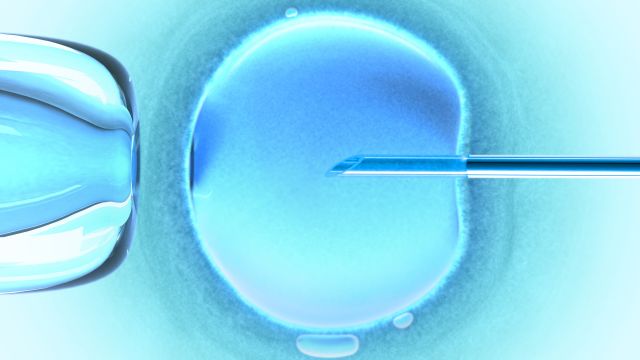Updated on February 29, 2024.
Just a few decades ago, freezing your eggs to preserve—or extend—your fertility wasn’t really an option. But as technology has continued to improve, and especially since the American Society of Reproductive Medicine removed the label “experimental” from the procedure in 2012, the number of people harvesting and storing their eggs for later use has continued to grow. Today, about 2 percent of babies in the United States are born using Assisted Reproductive Technologies (ART) including egg freezing, according to the Centers for Disease Control and Prevention.
There are numerous reasons why someone might want to freeze their eggs. Some people do it for medical reasons: Chemotherapy, gender-affirming surgery, and treatments for endometriosis can all hinder fertility. Others may choose to preserve their eggs during their peak years of fertility for personal reasons: They may not feel ready to become pregnant at the moment because of social factors like their relationship status or their work and they may want to extend the window of when they will be able to start a family.
If you’re wondering whether this procedure might be right for you or what to expect if you do decide to go ahead, here are some key things to consider.
It’s better to start the process early
One of the most important things for people to know is that freezing eggs earlier in life is better than waiting, says Jessica Shepherd, MD, an OBGYN and founder of Sanctum Med and Wellness in Dallas, Texas. While it is possible to become pregnant and deliver a healthy baby well into your 40s, the quality and number of your eggs starts to decline around age 30.
One study found that the greatest success in achieving a live birth was with eggs harvested before age 30 and when balancing fertility with the costs involved, the most cost-effective age for freezing was 37. “Women in their early 30s who know they're going to push off childbearing for another four or five years should freeze their eggs then, instead of waiting,” Dr. Shepherd says.
If you have cancer and need to undergo chemotherapy, your healthcare provider (HCP) should discuss options for freezing your eggs beforehand. “Treatments like chemo can damage the integrity of the eggs," says Shepherd.
It's a multi-step process
About two weeks prior to the actual retrieval of your eggs, you’ll self-inject hormones daily for 10 to 12 days to stimulate egg production. Once your eggs have matured in the ovaries, your HCP will retrieve the eggs by inserting a small ultrasound probe through your vagina to find the follicles in your ovaries. Then a thin needle will be guided through the probe to retrieve the eggs.
The process takes about 15 to 20 minutes and it’s done as an outpatient procedure. Most people take medicine to help them relax and relieve pain. The eggs are then frozen to be stored for future use.
When the time arrives for your eggs to be used—whether that’s a year later or a decade later—they’ll be thawed and then combined with healthy sperm during the in-vitro fertilization (IVF) process. Three to five days later, if embryos form, one or more will be placed in your uterus. About 10 days after that, a blood test can check for pregnancy.
It is an expensive procedure
The total cost from start to finish depends on your location and clinic, but you can expect to pay at least $10,000 for the initial medications, egg harvesting, and storage. Down the line, thawing, fertilization, and embryo transfer will cost several thousands more. In many cases, the process is not covered by insurance, though you should always check with your HR department to see if your company covers some of the costs.
For some people, the process will take multiple tries and some clinics and hospitals may offer reduced costs for those who undergo two or more rounds of treatment. Payment plans are often an option and some insurance companies and infertility groups can help with the costs, as well, says Shepherd.
It’s not 100 percent effective
With many ART options, the process is not guaranteed to be successful. Your eggs may not survive freezing, thawing, or fertilization, or you may have to repeat the process multiple times to get pregnant. The odds of a single frozen egg leading to a successful pregnancy is about 2 to 12 percent, according to the American Society for Reproductive Medicine. Those chances increase the more eggs you freeze.
“There’s a possibility that you may not harvest the size or the amount of eggs that are optimal for retrieving,” says Shepherd. "Or, if they are retrieved, they may not be the quality needed for an actual pregnancy, so they won't recommend you freeze those."
The timeframe in which someone preserves their eggs is a major factor in its success rate. Freezing during peak reproductive years (generally by your early 30s) increases the chances.
It's more likely to lead to a multiple birth pregnancy
Using IVF may increase your chances of becoming pregnant with twins, triplets, or more. That’s because multiple eggs are often fertilized during the process and more than one embryo may be transferred to your uterus. Many HCPs recommend limiting the number of embryos transferred and some even suggest one at a time is best if there are multiple options.
There are side effects and risks
The process for retrieving eggs can be uncomfortable and can cause side effects. There are also some mild-to-moderate risks involved. The injections may cause ovarian hyperstimulation syndrome, during which your ovaries swell and cause bloating, nausea, cramping, and other symptoms. As with any surgical procedure, there is a risk of bleeding and infection during egg retrieval.
Once an embryo is transferred and successfully implants in the uterus, the risks are similar to those of pregnancy, though the rate of birth complications is slightly higher for those who use IVF than the general population. Whether the increased risk is due to the IVF procedure itself or the parent’s age and other factors is still being studied. If you become pregnant with multiples, you have the same risks as any multiple pregnancy, which include preterm delivery, gestational hypertension, and an increased risk of birth differences such as spina bifida.
But one of the major benefits of egg-freezing technology is that it enables you to begin trying to start your family when the time is right for you.







